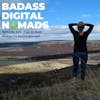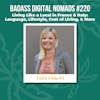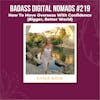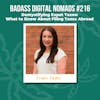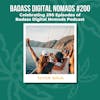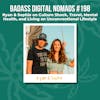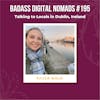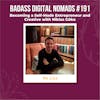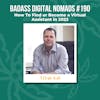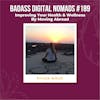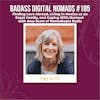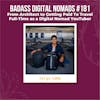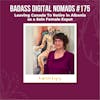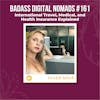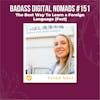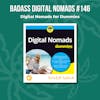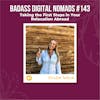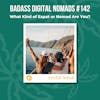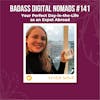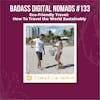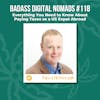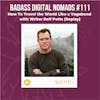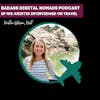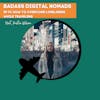How to Renounce Your US Citizenship: Part 2 (+ YouTube Drama)
In Part 2 of How to Renounce Your US Citizenship, Kristin and special guest, Erika Lind, talk about the pros and cons of renouncing your citizenship and why Erika decided to break up with the US for good. She gives you a detailed look into the process...
In Part 2 of How to Renounce Your US Citizenship, Kristin and special guest, Erika Lind, talk about the pros and cons of renouncing your citizenship and why Erika decided to break up with the US for good. She gives you a detailed look into the process of renouncing your US citizenship and gives valuable advice for people thinking about doing the same.
Although Erika has been living in Vancouver, Canada for the past five years, she explains why she went to Mexico to speed up the renunciation process. She also shares her honest opinions on American society and government, and sheds light on what life is like after renouncing her citizenship.
Finally, Kristin and Erika discuss what happens to regarding taxes, collecting social security, and more.
Have you ever considered renouncing your citizenship or are you curious about the process? Tune in to get all the information you’d need to make an informed decision. Who knows, maybe it's the right choice for you!
► Headed overseas? 🌍 Check out Kristin's favorite:
↳ Travel Medical Insurance: http://bit.ly/SafetyWingIns
↳ Global Health Insurance: https://bit.ly/RemoteHealthIns
↳ Online Bank Account: http://bit.ly/transferwisebank
EPISODE 115 TOPICS DISCUSSED:
- The pros and cons of renouncing US citizenship
- The process of renouncing step by step
- Logistics of renouncing US citizenship: The required documents and information needed to renounce.
- How long it takes to renounce your citizenship
- How much it costs: fees and exit taxes
- What happens to your retirement and social security?
- What it’s like to travel to the US after renouncing your citizenship.
- How Erika's political and societal values shaped her decision to renounce.
- Why it’s so difficult to pay US taxes while living in another country.
- Pros and cons of having passports from multiple countries.
QUESTIONS ANSWERED:
- How difficult is it to renounce your citizenship?
- Why not keep both your US and Canadian citizenship?
- Did you consult accountants, lawyers, or any other professionals during the process?
- How much does it cost to renounce your citizenship, including exit tax and application fees?
- How long does the process take?
- How did your friends and family react to your decision?
- Do you think you’ll ever regret renouncing your citizenship?
- What was it like solo traveling to Mexico to renounce during COVID?
RESOURCES
Videos:
- Watch the video version of this interview (coming soon)
- EXPAT EXPLAINS: Americans Abroad on Paying Taxes and Renouncing Citizenship (Greenback Tax Survey)
- 8 Reasons Why People LEAVE Costa Rica [Why I Left]
- Living in Japan as an American Abroad (what it’s like)
Related Podcasts:
- How to Renounce Your US Citizenship Part 1: Moving to Canada
- How U.S. Expats Feel About Paying Taxes Abroad and Renouncing Citizenship
- The Shocking Truth About How US Expats Vote
- Inside the Real Bangkok, Thailand with Erick Prince, The Minority Nomad (Part 1)
- Inside the Real Bangkok, Thailand with Erick Prince, The Minority Nomad (Part 2)
Other Resources:
- IRS Website
- IRS Expatriation Tax
- IRS Renouncing US citizenship
- Nomad Capitalist on renouncing citizenship
- Retaining social security benefits after renouncing
- Republicans Overseas
- Democrats Abroad
Connect with Kristin:
- Follow on Instagram
- Subscribe to Traveling with Kristin on YouTube
- Subscribe to Digital Nomad TV on YouTube
- Follow on Medium
- Follow on Clubhouse @KristinWilson
- Join the Badass Digital Nomads Facebook Group
...........................................................................................
Support the Badass Digital Nomads Podcast:
- Buy Me a Coffee
- Become a Patron
- Leave a 5* Review
- Buy Official Merch
- Search All Episodes at www.badassdigitalnomads.com
...........................................................................................
Thank you to my 2021 Patrons: Teklordz, Trader Walt, Shawn, Gary, Gary R, Yozhik, Bronwyn, Cynthia, Erick, Yasmine, Mike, Isaac, Michael, Scott, Karen, Erik, Heather, Craig, RZ, Timothy, Richard, Fred, Lakshay, Yohji, Annie, Ray, Ron, Henry, Kelly, Alejandra, Keith, Stephen, Eddy, Warren, James, Javier, and Daniel.
Warm welcome to my newest patrons: Rich, Emily, Aisha, and Phil!
Become a Patron for $5/month at Patreon.com/travelingwithkristin
...........................................................................................
Podcast descriptions may contain affiliate links of products and services we use and recommend at no additional cost to you.
Kristin Wilson, Host: 00:00:00 Before we get into today's episode of Badass Digital Nomads on renouncing US citizenship, I have a quick disclaimer slash reflection on the controversy that happened this weekend when I published the video version of this interview on my YouTube channel on what happened to be the 4th of July. So in case you missed it, here's what happened and here are my thoughts moving forward. Back in 2018, 2019, I used to publish my podcast interviews on YouTube, but I stopped doing that in 2020 because they take a really, really long time to produce. We try to do high production value. So even if I delegate the editing to someone else, it just takes a really long time to make and review hour plus long video interviews that are interesting to watch. So I stopped doing it during the pandemic to focus more on travel updates and more urgent topics.
Kristin: 00:01:04 And then this year when I had Eric Prince, the Minority Nomad on the podcast, I had the idea to publish his interview on YouTube because he also has a YouTube channel. So we published his two-part interview on YouTube, and you guys really enjoyed it. Everyone commented that I should publish more of my podcast interviews on YouTube, so my team and I decided to give it a try. The next interview that came out was Kevin Martin from 30 in a Wake Up who also had a YouTube channel. And then this interview on renouncing US citizenship was next, which I knew we had to publish because so many people asked for a video on this topic in the comments of my previous videos on living abroad. So we recorded this interview on May 28th, and then part one finally came out last week on living in Canada. And as I was preparing the video for part two, it dawned on me that it would coincide with the 4th of July, the US Independence Day.
Kristin: 00:02:14 And so I thought that was a pretty bizarre coincidence, actually quite ironic, but I didn't really think much of it otherwise. And then to my dismay, within approximately five minutes or less of posting the video, I noticed really quickly that people in the comments had a different perspective and many quite logically assumed that I had planned for this video to come out on the 4th of July to basically troll the United States and promote some type of anti-American sentiment, which was definitely not the case. So hindsight is obviously 2020, and I can see how that would look and why people would think that because the timing did appear, quite suspect, alas, that was not the point of the video. So things escalated pretty quickly. And within about half an hour or so after talking with my Patreon patrons and getting some feedback from people, even though the majority of the people who I asked said I should just leave it up, I made the executive decision to pull the video temporarily because I didn't want the date that I posted the video to detract from the content in the video.
Kristin: 00:03:35 After that, I posted on YouTube and in my Facebook group in Badass Digital Nomads just explaining the situation, apologizing for the misunderstanding, and asking people if they were interested in this topic and if they still wanted me to post the interview at a later date. And overwhelmingly, everyone said to repost the video. So I will on a more tasteful day, but I wanted to also add this extra intro to this podcast version because I think so many positives have come out of this debacle. And I think it's made us all really think more deeply about the stigma around renouncing one's citizenship, uh, the assumptions that people make, and also the layers of subjectivity around this idea of renouncing and the symbolism and interpretation of any possible significance of talking about this topic. On the US Independence Day, of course, a country that stands for freedom of speech, freedom of expression.
Kristin: 00:04:47 And so all of this is still kind of running through my head. It's been less than 24 hours, but I have a few thoughts for you to contemplate before listening to this interview. And I'm sorry it's adding a little bit of length to the runtime of this episode, but I think it's really important that we talk about it. So there's at this time close to 250 comments on just one of the posts. And I wanted to summarize some of the, the recurring themes that came up in your comments. The first theme that emerged is that it was no big deal and that the majority of people subscribed to my channel, at least were not offended whatsoever. So many people came out in support and and just said, you know, you can't please everyone. Some people are more sensitive than others. And luckily no one thought that I published it in bad faith.
Kristin: 00:05:43 So that was the first thing that most of the comments that were up voted were about that. And then another thing, coincidentally this morning as I was making breakfast, I was listening to podcasts on autoplay. This episode of The Daily Stoic came up and Ryan Holiday was saying it was an interview with two writers of kids books, actually, which I would normally not listen to 'cause they don't have kids, but it, he was saying in this conversation that as humans and as parents as well, you know, as examples to your children, we should try to be respectful of each other. Obviously, you know, the golden rule, all that good stuff. But to remember that it's also within our individual agency as adults to choose what we let offend us and then how we react to things in the external. Of course, this is easier said than done, but this is a practice that we can cultivate and I interpreted it as a positive sign to hear Ryan and his two guests talking about that this morning, especially after what happened yesterday.
Kristin: 00:06:57 Which brings me to the next point, which is that by far one of the most important values that I've learned as a traveler and as an expat living as a guest in foreign countries, is that I don't know everything <laugh>, that I don't have all the answers, but also to live and let live, as long as you're not hurting someone else or adversely affecting the community at large, let's accept everyone's way of life. You know, even though I don't have any intention of renouncing my citizenship, mostly for family reasons, someone else's decision to do so, in no way infringes on my quality of life. And I want to learn from people who are different from me. I want to change my beliefs and my opinions. I want to keep an open mind. And like Eric Prince said on episodes 107 and 108, he said, someone please destroy my worldview right now.
Kristin: 00:08:08 Like that really struck me because very few people ask for that. But through travel, we can break down our beliefs and we can build new ones that serve us better, that serve the world better and that are more productive and empathetic and enjoyable. So as a travel community, I think that's just a really important value that we're accepting of everyone. We're accepting of other people's decisions, and not only accepting of them, but we might strive to be like them. We might admire them, we might learn from them, but by not talking about renouncing, we make it this kind of taboo topic when in reality it's just a really mundane paperwork process, albeit with you know, some pretty significant long-term implications, but recognizing that we even have the ability to choose which country we want to be citizens of merits, that we bring this discussion into the public forum.
Kristin: 00:09:17 We should be talking about the trade-offs. We should be talking about the pros and cons and the implications that remote work and global migration will have with regard to the concept of citizenship and citizenry in itself. We have the development of internet countries on the horizon that you're actually gonna hear about a few weeks from now in my interview with uh, Sondre the founder of Safety Wing. But we definitely shouldn't be censoring ourselves within our very tiny bubble of a location, independent community, or accepting the status quo as it is without any investigation. Because a lot of times the status quo is just how it is because that's the way it's always been. And that's actually something Ryan Holiday talked about in another episode of The Daily Stoic. I heard a week or so ago that someone somewhere in a government office made some policy and then it had this butterfly effect that has affected hundreds of millions of people ever since.
Kristin: 00:10:27 So we should be digging deeper, and it's only by bringing awareness to something that society can assess if it should be changed or if it should be improved. We have to ask questions and we should, when it comes to renouncing among other things, but with renouncing, like why is it so such a covert process? Why are there so many barriers? Why is there so little information? Why is it so expensive? Why is it seemingly discouraged? Does the tax system need further reform? What should that change be? You know, there's so many other questions that we can be asking if we talk about it. And then I also wanted to highlight the fact that this is by no means exclusively a US issue. I did a little digging and it seems that there are allegedly 17 countries that don't even allow their citizens to renounce their citizenship with Argentina being one example.
Kristin: 00:11:33 And then there's other countries that don't allow dual nationalities and then everything in between. Someone from Iran commented on my YouTube post that he wanted to renounce because it was so hard for him to just go on vacation just to travel for tourism with an Iranian passport. So that's another thing I didn't think about. We should probably be doing an episode on the hypocrisy really of what gives a passport its power, because that's probably an outdated, unfair, somewhat racist concept. Then there was the question of why it's anti-American to post about renouncing your citizenship. So is it even anti-American to talk about this? No. A lot of US citizens and former military service members commented that they weren't offended whatsoever by this topic. And that respecting or admiring America is not mutually exclusive with talking about renouncing citizenship. I mean, people could have a million reasons to renounce their citizenship objective reasons that you know are not emotionally charged, but if they are, who caress, you know, so be it.
Kristin: 00:12:52 What we know from surveys is that the main reason that people renounce in the US is related to the complexity and the cost of filing taxes from abroad. So you could love the us, you could be a huge fan, but if you don't live there for whatever reason, and you renounce, that's a separate thing. And likewise, if you hate the US or if you don't identify with its principles, with its culture, with its policies, that's fine too. Isn't it better to renounce and go somewhere else that you like better? If you want, why not? You know, we could have people that don't want people to renounce. They might think that no one should renounce the citizenship where they were born. And then we have other people that think no one should be able to get citizenship and come in. And then in my own family, my grandparents renounced their citizenship from Hungary, Romania, Italy.
Kristin: 00:13:50 And because they renounced, especially in the case of Italy, it's harder for me to try to get that citizenship <laugh>. So you know, this has been happening through generations for different reasons anyway, there's a million reasons why people might want to renounce their citizenship, but what you're going to hear Erika and I talk about today are all the different factors that she weighed in making this decision over the years and how much happier she is because of it. And that makes me happy. And then another really important thing that came up was the perspective of Native Americans and indigenous people in celebrating the 4th of July. So I just finished a book called The River of Doubt about Theodore Roosevelt's ex expedition up an unknown unmapped river in the Amazon, I believe it was in 1914. And there was a lot in this book about the mistreatment of Amazonian tribes and how they weren't even considered human beings. And I need to brush up on my history around that time period. And also the, you know, the founding of the United States and everything that happened in those hundreds of years, uh, before the US was the US. But that's also something to keep in mind, that there's different perspectives. So what might seem anti-American to one person might seem different to another US citizen who has a different family history.
Kristin: 00:15:32 All of this is to say that people like you and I, people who love to travel, we want to travel because it changes us for the better. We know that getting outside the borders of our home countries and getting outside of our comfort zones is going to help us grow as human beings. Expand your mind, experience what life is like in other cultures. Have conversations with perfect strangers who then become your best friends and just learn. Learn more about yourself, learn more about the world. And you know, the more you know, the more you realize you don't know. And that's one of the big strengths of world travelers. I know that you guys will keep an open mind with this topic or you wouldn't be listening to my podcast to begin with. So thank you for being here. Thank you for being a leader in this location, independent remote travel revolution that's happening right now.
Kristin: 00:16:41 So important for us to be informed, keep an open mind, and to shape public discourse about issues that are even more and more important during this post pandemic world. We are in the beginning phases of this era. We are designing the future today and we shouldn't fear information. You know, we can filter it. We can filter and decide what's real, what's significant, what's useful, what's productive. And so based on everyone's feedback and my own, I'm going to put the video back out this week on a different day. That's not the 4th of July. Um, but if you would like to opine about this, please head over to my community tab on YouTube, Traveling with Kristin or in Badass Digital Nomads Facebook group. We've got a post going on over there. And without further ado, here is the actual episode on How to renounce your US citizenship. Enjoy.
Introduction: Welcome to Badass Digital Nomads, where we're pushing the boundaries of remote work and travel, all while staying grounded with a little bit of old school philosophy, self-development, and business advice from our guests.
Kristin Wilson, Host: 00:18:11 Hi everyone. Kristin from traveling with Kristin here and welcome to episode 115 of Badass Digital Nomads podcast. And welcome to part two of my conversation with Erika Lind, a fellow podcast listener and YouTube subscriber who came on the show to share her experience renouncing her US citizenship. This was a fascinating conversation on a topic that is often overlooked or kind of covert. She really goes into detail about how she decided to renounce where she started with the process and what she found, kind of the red tape, pros and cons, the cost, how long it would take, and the different ways that you can go about renouncing and what actual documents and requirements are needed. She also talks about flying down to Mexico during the Coronavirus pandemic to make this happen, how she was able to speed the process up and also what this means for her future, how she had to give up her passport, what it will be like if she's going to travel to the US in the future, how many days she can stay there if she needs to get a visa.
Kristin: 00:19:27 We also talk about second passports, different countries. You can go to pros and cons of that. Just a really, really interesting and valuable conversation that I hope you get a lot out of. And I hope that this clears up and answers a lot of the questions and curiosities that you've had about what it's like to give up your US citizenship and if it's something that you want to consider someday in the future. Also make sure to check the show notes on this and every episode because we're linking to all of the resources we talk about over there. And today I would like to give a shout-out to Renante from the United States who left a five-star review for Badass Digital Nomads on Apple Podcasts. He says, informative and entertaining. What a Find Kristin's podcast has quickly become one of my favorites since I discovered it late in 2020.
Kristin: 00:20:23 I spent a couple weeks binge listening as well as checking out the blog and YouTube channel, Could not get enough. If you like hearing about practical tips on the digital nomad lifestyle travels to interesting places, sound advice and excellent and engaging interviews. This podcast is for you. Thanks so much, Renante. And if you're listening right now, please consider taking a moment and heading over to your preferred podcast platform, leaving a five star rating and review for the podcast. It really helps to get the show out there and share it with other like-minded people around the world. I would just like to thank Erika again for coming onto the show, opening up and being so candid about her experience as a solo female traveler, as well as someone who has successfully renounced her US citizenship. Enjoy this conversation. And in just in case you missed it, you can also check out part one on her lifestyle and cost of living in Vancouver, Canada in last week's episode. Enjoy.
Podcast Interview:
Kristin: So, let's talk about renouncing your citizenship. This is a question that in a YouTube video I was doing on the US Expat tax survey by Greenback Tax Services, who I have also had on the podcast now because of that survey. And you commented on the video and shared that you had renounced. So here you are on the podcast telling us about it. <laugh>, what led you to decide to renounce your citizenship? Why not just keep both?
Erika: 00:21:58 Well, it's just being an expat is difficult for me. I didn't really feel American and I decided that I didn't wanna ever go back and live there again. So then it's like, okay, well what value do you have in keeping the US citizenship? Um, and I already was in disagreement with the values of America and the US government and the equal rights of people and all that political stuff. So it just seemed like this is a, a society that I didn't wanna be connected to anymore. But probably the biggest, like the straw that broke the camel's back you could say is just all the tax filing. It's just really difficult. You have to file a US tax report every year and can then I have to do the paper form because they don't allow you to e-file if you're using the foreign income exclusions. So then you have to do the paper form and then you have to pay because the free versions don't allow you to do the income exclusion and then to pay, you have to use a credit card with the billing address that's based in the US and they don't allow you to use any of your foreign credit cards so that I have to go and get somebody to let me use their credit card.
Erika: 00:23:05 Like it's just a big headache. I think that as I grew in my career success, it just became more and more inconvenient. 'cause once you have a certain amount of money in the bank accounts, then you have to declare your bank accounts to the IRS. And if you have investments for retirement, you have to declare those. And then if you buy property, you have to report that back to the IRS.
Kristin: 00:23:28 And these are all separate forms for people listening. Like it's not just you report it on your tax return. It's like there's a whole nother form to fill out. There could be tax implications for this investment or this property or this.
Erika: 00:23:40 Yeah. Because the capital gains are not exempt. Like if you, like if I live and work in Canada and make money here and then I go and buy a house, I have to report that back to the IRS and then let's say I sell the house and then it's, the value has gone up. So then you have to pay capital gains tax on that to the United States, which to me doesn't make any sense. And it just, it started to like great aby Yeah. As time went on, like this isn't, it's not fair and it's not right. Like I shouldn't have to pay taxes to the US on foreign assets and my foreign lifestyle. That has nothing to do with down there. So yeah, it just started to like get into me personally after several years of, of all this. And so yeah, then I finally was like, okay, I wanna, I'm not going back. It's bothering me that I have to do all this. And so then I started, you know, looking into, okay, how do you, how do you renounce <laugh>?
Kristin: 00:24:35 Yeah. Especially if you have no intention of going back. Like it's one thing if you go abroad for five years or 10 years and you chalk this up to a sunk cost or paperwork cost headache that you're gonna have to deal with for a few years before coming back. But it's quite another if your, your career is taking off in another country, you have roots your whole life there. And then you're just as an afterthought reporting everything and filing back in the US And then I would imagine that you, once you exhausted that foreigner and income exclusion, you're paying additional income taxes Yeah. As well for services that you're not using infrastructure, that you're not using healthcare that you're not using because you're in, you know, part of the Canadian healthcare system. So that gets quite annoying. And this also is, your answers are really consistent with the outcome from that Greenback tax survey where the number one reason that people said they wanted to renounce their citizenship was the complexity of filing US tax returns. And so it's unfortunate that it's a, it's affecting a small percentage of the population, but for us it is a huge annoyance and an expensive one.
Erika: 00:25:45 Yeah. But yeah, I guess if, if I had the traditional digital nomads where they go to another country and they're just, but they still continue to operate in the US financial system, then I think it like makes sense. Like if you're just working remotely while you work for some US company and you still use your US bank accounts and maybe you'll move back or something like, maybe then it makes sense. But when you've completely separated your entire lifestyle from the US systems and you've settled into a foreign country and you're then using their systems like after a while you, it's, it's an interesting experience where you leave and you embed yourself in another society and then like at first you still kind of feel like you're of the country that you came from, but the longer you're away, the more that kind of, that identity leaves you become the identity of the place that you're living. And then your old place begins to feel more and more foreign as the years go on. And then eventually you're like, I have no connection to that other place. I don't wanna be tied to it at all. <laugh>.
Kristin: 00:26:50 It's a very unnatural relationship. It's like getting married to somebody, but you're still texting your ex-boyfriend every day. <laugh>. Right. Cut that off <laugh>.
Erika: 00:27:02 Exactly.
Kristin: 00:27:03 Oh God. Do you think that you would have renounced your US citizenship if you didn't have Canadian citizenship when you have sought out an a second passport and still gone through the process?
Erika: 00:27:15 Yeah, I don't know. I don't know if I would've moved if I didn't already have a second citizenship. 'cause a lot of people go through all this work, like they go to a school so they can get in with a student visa and they, or maybe they just wanna travel and they find all these online jobs and, and that didn't really appeal to me that I left just because I favored the Canadian system and it was easy for me. I already had the Canadian passports. I just packed up all my stuff and drove up to the border and say, I'm moving here. I'm Canadian and they let you in. So I don't know, gone through all that you have to go through to immigrate if it, you know.
Kristin: 00:27:53 Let's say hypothetically if you were to say before you went through the process and after, was the process so difficult that you would do it again?
Erika: 00:28:04 Yeah, It was difficult, and mostly just because it's difficult to figure out how to do it. There's no one central website or something that gives you all the instructions. You basically have to just contact an embassy and say, Hey, I'm interested in doing this, what do I do? And then usually they'll have some kind of auto response where they send you these instructions and they give you the documents that you have to fill out and, and all this kind of stuff. Um, and I did that for the Canadian one and then they write back saying like, oh, this could be take like two years. Like I think even before the pandemic there was like one to two year wait just to get an appointment and to do it. And then like all of last year they just completely stopped processing applications. So it was like, okay, this could take three years if I do it here and though I'm ready to do it.
Erika: 00:28:50 And then by this point I'd saved up the money for the fees. So the money wasn't a problem. And then I think at that point I started contacting other countries. 'cause I know like some parts of the world you can just go to and it's no problem to get in. In my case, I went down to Mexico, so it was like, well if I can fly down to the Mexico, you can get an appointment a month from now. But if I wait to do it in Canada, I'd have to wait three years. Like what's the sense in that <laugh>?
Kristin: 00:29:17 Was that at the US Embassy in Mexico or the Canadian?
Erika: 00:29:22 No, No, it's, it's the US embassy. Okay. So you have to, you have to do it at a US embassy that's outside of the United States.
Kristin: 00:29:27 Let's walk back through this process. 'cause I wanna get like the exact step-by-step details for people because it seems like a really convoluted process. Unnecessarily like lots of paperwork. So bring us back to the day that you decided to start looking into this. Do you remember approximately when that was? When you started exploring how to renounce your citizenship?
Erika: 00:29:51 Oh, this, I've probably been thinking about it on the back burner for several years. Okay. It was probably only, I'd say within the past six months where I was really like really motivated to do it. And I had the money saved up for it. I had all the documents together where I was like, like ready to pull the trigger. But I'd kind of been thinking about it in the back of my head for several years and I'd be like searching on YouTube and searching like how do you do this? Where do you go and what do you have to do? And, and then the whole thing with Covid, they've been shutting down all these services at various embassies. So it's like, well are they just trying to stop people from doing it because it kind of feels like the US doesn't wanna let people go. They, they make it more and more difficult.
Kristin: 00:30:27 Yeah. I think that it's a bit of a casual side effect of the process because I've, one of the reasons I came to Miami was to try to get my Romanian citizenship through my grandfather, but the consulate closed during the pandemic because every government agency closed. And so I think that was just a coincidence. I definitely don't think that the US government wants to encourage anyone to give up their citizenship because when you think of the lifetime value of that person as a customer, if you think of US citizens as customers of the government or the IRS that is extremely lucrative revenue stream if you live to be 70, 80, a hundred years old. And so of course they don't want people to sever that tie. They don't wanna make it really easy. They wanna probably discourage it in some way. But I don't know if they have the, the intentions or the resources to actually put up lots of extra barriers the way that allegedly the, the government in Florida did to keep people from claiming unemployment for example. Like I, yeah.
Erika: 00:31:32 No it's not, It's not like that. But I think that the US government doesn't, like the interests of expats are not--
Kristin: 00:31:38 Not a priority
Erika: 00:31:40 in their hearts at all. No <laugh>. But yeah, so basically the process was I emailed all these different countries, the US emesis and I eventually found one that was taking cases, this was in the Yucatan state in Mexico where I guess covid was not that bad. And so the embassies were still operating.
Kristin: 00:31:58 It's amazing that's so resourceful to start and finish this process during the pandemic and to do it from Mexico is outstanding.
Erika: 00:32:07 So I'd contacted five or six other countries before I came, come to this embassy. Um, and you just have to individually contact them. It's not like there's one centralized system where it's like, oh well this place is taking applications. You have to, they're not really talking to each other. So I contacted a bunch of different places. Eventually I found one in Mexico, I sent them my documents and then I think that they kind of space it out in these steps because they want you to reconsider <laugh>. So I, I would think it was probably a month after I emailed them my documents before they set up a phone appointment. I think normally you would have two in-person appointments before Covid and then, but now they just do the phone appointment as the first one. And that's basically just to explain all the legal percussions of what you're giving up. And they're like, you understand you won't be able to live in the country anymore and if you come visit, you'll be visiting as a foreign visitor and no longer as a US citizen.
Kristin: 00:33:01 You go in the other line, no global entry <laugh> or maybe 'cause you're Canadian. But okay, so your first step was mulling it over in your head like, maybe I should renounce my citizenship someday. Or maybe this is something that would be realistic to me, beneficial to me. Your next step was then Googling how the heck do I do this? Where do I start? probably hitting a lot of dead ends, outdated information. And then you started basically cold calling and emailing the US institutions in the US and in other countries and trying to figure out the timeline for how long it would take. And you were able to reduce it from like two to three years down to six months or l
Erika: 00:33:45 Less than that, I think it was. In fact when I contacted the, the Mexico embassy, I had my phone appointment and they're like, okay, well let's have you come in next month for a person visit. Like that was like a month away. And I, in my head I had planned that it would take so much longer than that. And then when they're like, okay, you can come in in a month from now, I actually had to postpone the appointment 'cause I needed extra time to get ready for the trip. <laugh>.
Kristin: 00:34:12 So you, so you literally fly to Cancun and then, or where was the office?
Erika: 00:34:17 This was in Merida.
Kristin: 00:34:18 Okay. So you would've flown to Cancun probably from, were you in Canada already?
Erika: 00:34:23 Yeah, So I flew, I, I drove to Washington. Okay. And I, I still have the US passport at that point. So I was able to drive across the border and then I flew from there to Texas and I changed planes in Texas and then I flew from there down to Mexico. But yeah, it was so many steps. I remember being at the office and at the in-person appointment and explaining like what it, what it went through to just to physically get there. And then she was like, wow, you must really wanna do this. <laugh>.
Kristin: 00:34:51 What month was this in the pandemic?
Erika: 00:34:53 This was just recently. This was uh, April.
Kristin: 00:34:57 So it was 20-- April of 2021 that you finalized it?
Erika: Yeah.
Kristin: Yeah. Wow. Okay. This is fascinating. What were some of the documents that were required to, to complete this process?
Erika: 00:35:09 So you have to send them proof of your US citizenship and also proof of your foreign citizenship. So you have to send passport.
Kristin: 00:35:17 So you have passport to passport. You can't be a stateless citizen, you have to have another passport.
Erika: 00:35:21 Well that's kind of a, I believe that the law doesn't technically forbid being stateless, but they don't want you to be stateless.
Kristin: 00:35:31 They might not approve you if you didn't have another citizenship.
Erika: 00:35:35 Yeah. So basically you go through this application and then the consular official is making a recommendation to the state department.
Kristin: Okay.
Erika: To can to have you lose your citizenship. So if you don't have a good case or situation, like they could not recommend--
Kristin: 00:35:53 Lightly decline <laugh>.
Erika: 00:35:56 So when yeah, when you apply you have to show both of your passports 'cause you have to prove that you have another citizenship and then you have to show like social security cards and birth certificates. 'cause they have to verify that you really are a US citizen and then your photo IDs and Yeah. All kinds of stuff. So you email that to them and then you do the appointment. So by the time you come for the in-person appointment, it's basically all planned out that you have a successful case because I don't think they would even schedule you to come in unless everything was in order.
Kristin: 00:36:27 Did you consult with any accountants or lawyers or any sort of professionals or did you go through the requirements and you felt like you could handle getting together all the documents you needed?
Erika: 00:36:40 Well I had, I had all the, I had all the documents. I had uh, basically just photocopy your passports and your birth certificate and your social security card and all that kind of stuff. And then I'd been filing my taxes every year as a expat. So I think it'd be more complicated if you had other tax situations. Like if you had property and if you're like a really high net worth where you might have to deal with exit taxes, stuff like that. Yeah. Then it probably would've more complicated. My case wasn't that complicated 'cause I didn't have any of that stuff. So I could just say I've been filing my taxes, I don't owe any tax. And so therefore there's, there's no problem.
Kristin: 00:37:17 You weren't Eduardo Severin, the Facebook co-founder or Adam Vian, Dan Ian's brother, they probably had a little bit more paperwork to do. I would imagine being such allegedly high net worth individuals.
Erika: 00:37:31 Yeah. So for me it was just like, 'cause a lot of people probably renounce four financial reasons, right? Like maybe they have a business or they've got all these properties and they've got all these thing, maybe they're trying to separate because it's taxes. For me it was just kind of personal reasons and I, I didn't really have any really complicated financial system that that would've gotten in, in the way. But I did contact lawyers and, and things just to sort of get some information, you know, 'cause it's like what if someone has student loans and then they're on some kind of repayment plan and then you're like, okay, well what, how is this gonna affect that? So I, I think it is, it is advisable to speak to a lawyer and just to sort of understand all of the repercussions of to what's gonna happen before doing it.
Kristin: 00:38:16 Right. Were there any repercussions that you discovered during the process that you weren't expecting?
Erika: 00:38:22 Not really. The only thing I was a little bit concerned about was getting home because I had trav- traveled through the US to get there. So then my thought was, okay, well if they take the US passport, what happens if, if I go back to the US 'cause my car is parked at Seattle Airport, right? So what happens if I try to fly back to the US and then they don't let me in? Because then I was thinking in my head like, 'cause they're gonna ask you why you're coming and then what if I have to explain that I went there to renounce and then they have the discretion not to let you know any visitor in. So I was kinda like, well what could happen? Fortunately the embassy was really helpful and they allowed me to keep the US passport.
Kristin: 00:39:03 To get back?
Erika: 00:39:04 For my travels. Yeah.
Kristin: 00:39:05 So they didn't take your passport at the embassy. Wow. I didn't even think about that.
Erika: 00:39:10 Yeah, they didn't. They let me keep the passport. Um, they said you can keep the passport for your trip home but then you need to return it. So I, after I got here and I went through the two week quarantine to enter Canada, then I, I went to the US Embassy in, in Vancouver and, but I remember the experience of coming back. I was flying through Miami. That was like my entry to the United States to come back.
Kristin: 00:39:29 Always a complicated place to enter.
Erika: 00:39:33 Yeah. And so, yeah 'cause you change planes and then you have to go through security again and then you have to go through the US customs. And I remember being on this plane full of Mexican people and they had to have their visas and all that kind of stuff just to get into the United States. And I was like one of the only people on the plane to be able to go through the US citizen line--
Kristin: 00:39:54 for the last time.
Erika: 00:39:56 Yeah. And I remember because you had a plane full of people that were lined up in the customs processing and they were being asked all of these questions and they might have to wait in line for you know, 30 minutes or an hour because they gotta check everybody and ask them all the questions. And I went up through the US citizen line was, didn't have to wait for anybody. They basically just said or do you have anything to declare? And then I didn't so I said no. And then I was through in like less than 30 seconds.
Kristin: Wow.
Erika: And I was thinking to myself, this was the one shot, I'm never gonna have this experience again. <laugh>.
Kristin: 00:40:31 That is so surreal. Wow. How did it feel when you got to Canada?
Erika: 00:40:37 It didn't really feel any different because I'd already been living here for five years and this was kind of the society that I was already used to. So I guess a sense of relief because I knew that I would no longer have to deal with any of the difficult entanglements.
Kristin: 00:40:54 I guess it's kind of like quitting a job or breaking up with somebody like it's a bit sad, a bit cathartic a bit. You get like a little bit of buyer's remorse at the end or I guess seller's remorse. You're like, am I making the right decision? But then you have this relief after. Yeah,
Erika: 00:41:11 It's like break I guess it's like breaking up with someone, like the act of breaking up is stressful but afterwards
Kristin: 00:41:17 It's for the best.
Erika: 00:41:18 You know, it's the right decision.
Kristin: 00:41:22 Right. You speak from experience. Okay. How much did this cost? Just like the application process itself and then the exit fee,
Erika: 00:41:32 The processing fee is like 2,350 US dollars and that is actually not refundable. So if you went and then the case wasn't successful, you wouldn't get the money back.
Kristin: 00:41:43 Okay. Risky.
Erika: 00:41:44 So you really should make sure that all of your ducks are in a row before going, um, I didn't have exit tax. Uh, one because if you have citizenship from birth, then you're automatically exempt from the exit tax. So since I wasn't a naturalized citizen, I had it from birth through a family situation, then you're automatically exempt from the exit tax. Um, second thing is I think there's exemptions up to several million dollars. Uh, so you'd have to be quite wealthy before, before you'd really get hit with the exit tax. So I wouldn't have had to pay anything anyway. Um, but yeah, so there was the, that fee and then since I went down to Mexico, it was the cost of the trip. So I, I probably spent a couple thousand dollars just on the trip itself. So yeah, it was, for me it was, if it was purely a financial incentive, I probably wouldn't have done it. 'cause it's like okay you're spending $5,000 to do something when you don't owe any taxes anyway. So you have, maybe you have to pay the $50 every year to file your tax return. So where's the financial sense in that? But for me it was just, I had such a strong personal conviction that for me it was worth it.
Kristin: 00:42:53 I would think too that the, the mental space and freedom that you would acquire through this process would be worth the $5,000 and probably lifetime you would end up spending at least that much in time and energy and probably miscellaneous taxes and filing and accounting fees to cover that 5,000 quickly.
Erika: 00:43:14 And the stress like this, it was just like a weight lifted off my shoulders. As an expat you're always kind of thinking like, well what if they find out about some bank account I have or what if I didn't declare that I had this retirement stock fund or something like what am I gonna get in trouble with the IRS? And so just knowing that all of that is gone, it was just was like a relief.
Kristin: Yeah.
Erika: That I've felt safer and more comfortable and more at ease just in life generally since doing it.
Kristin: 00:43:42 Wow. That is significant. How long were you in Mexico total then? How long did the whole process take? Was it like 15 minutes in the office or an hour and then you leave?
Erika: 00:43:52 So it was a little bit more complicated because of Covid because uh, you have to get a covid test just to fly back to the United States. So I had to be there long enough to get tested, but I didn't wanna be there longer than I had to be because I didn't, because then you have more risk of getting infected, <laugh> getting trapped there. So I, I think I was there for about three or four days. And one thing I thought was really interesting was just the experience of going to Mexico was interesting.
Kristin: 00:44:19 Is that your first time?
Erika: 00:44:20 Interesting because-- Yeah. And before this I had no interest in really going to south like Central or South America. I would've never gone probably if it weren't for this reason, but I, I had such an amazing time.
Kristin: 00:44:32 Um, I heard great things about Marita.
Erika: 00:44:35 Yeah, that's amazing. The food is just amazing and there was warm weather the whole time. Everybody's friendly. But one thing I thought was really interesting was that even though the Mexico as a country, there's no COVID restrictions but the individual people were more diligent about it than in the US. Like everybody was wearing masks and if you went into a restaurant they'd temperature check you and then they'd make you hand sanitize before going into any store.
Kristin: 00:45:01 Um, they were self-regulating like Sweden.
Erika: 00:45:04 Yeah. So like even people walking around outside were wearing masks. Even when it's a hundred degrees out and people are going for, people are still wearing masks outside and when there's no law or government restriction telling 'em to do it, 'cause whereas in the US it's like a struggle to get anybody to do the right thing. <laugh>.
Kristin: 00:45:20 Yeah. That's significant. .
Erika: 00:45:22 Yeah. So I was there for about four days. I got the test a day bef I had, I had to be there long enough to do the test. I had try, I wanted to get a PCR test because you need a PCR to re-enter Canada and I think that it can take 24 to 48 hours to get the results.
Kristin: 00:45:37 Like a couple hundred dollars.
Erika: 00:45:39 Yeah. I had to pay about $300 worth two or $300 to get that. But even that was pretty streamlined. They, you can set up, uh, with one of the labs ahead of time and they'll just come to where you're staying and do the test. So you don't have to --
Kristin: 00:45:55 Hotel doctor?
Erika: 00:45:55 --to out to anywhere. Yeah, pretty much <laugh>.
Kristin: 00:45:58 Okay. So in total, the time you spent in the embassy was just in one day or one afternoon?
Erika: 00:46:05 Yeah. So that was another whole experience. It basically took half a day. I, I thought that I had emailed them all of my documents
Kristin: 00:46:13 That they would have everything together for you.
Erika: 00:46:15 <laugh>. That I wouldn't, that I, that they would have everything together. So I got there and I didn't have any of the papers 'cause they don't let you take anything in.
Kristin: 00:46:22 Yeah, I've gone to so many embassies, like passport pages and things and you have to put all your stuff in a locker and it's like high security.
Erika: 00:46:30 Yeah. So I went there and I go up to pay and then they said, well where's all of your paperwork? And I was like, well you guys already have it. And they're like, well we need, you need to have a paper copy. And so they actually forced me to leave.
Kristin: 00:46:42 Oh man this sounds so familiar
Erika: 00:46:43 To go get copies. Yeah. And it was so difficult. And then because nobody speaks any English, I didn't know where to go and then I'd left my cell phone at home because they tell you you can't take a cell phone.
Kristin: Yeah. Yeah.
Erika: Into the embassy. Yeah. So I was like, well I was like in a panic
Kristin: 00:46:59 Trying to find a place to print and copy stuff.
Erika: 00:47:03 I have this appointment and if it takes too long to get the paperwork, what if they cancel my appointment And then the whole trip is for a waste and I didn't know where to go and people on the street that I was trying to talk to didn't speak any English and I didn't have my phone so I couldn't translate. Eventually I found this pretty nice hotel and I went in and they were gracious enough to let me use the computer and print off.
Kristin: Wow.
Erika: Yeah. 'cause I had emailed it to the embassy checking. So I just went to my mail to my sent, printed off and I went back. Um, it probably took about an hour to do that. I went back up and um, went through the whole thing again.
Kristin: 00:47:38 Jumping through hoops. But it was, I have flashbacks of just trying to cross the Nicaragua border and like running back and forth across the border with Costa Rica getting like stamps on papers for my car <laugh> and things like that. Yeah. And this license plate stamp expired or whatever.
Erika: 00:47:53 It was funny because I went back to give them the paperwork and then I had already signed the forms but they need you to sign the forms in front of them so then they printed them off again. Okay. So you clearly have a printer.
Kristin: Oh god.
Erika: So you could could've printed all this stuff like they didn't, they make it more difficult than it really needs to be. .
Kristin: 00:48:11 Yeah <laugh>. But yeah, it must've felt good when you were done. I hope you celebrated with like a margarita and some tacos.
Erika: 00:48:17 <laugh> yeah, for sure. Yeah.
Kristin: 00:48:19 <laugh>, I heard the food was really good in Marita. So did you have any urge to go to Playa Del Carmen or Tulum or any of those spots or you were just there on a business trip?
Erika: 00:48:29 Not really. Yeah. 'cause I'm like as a traveler I'm really not into tourist destinations. So going to someplace that would be like a resort with a big hotel or something like that doesn't really appeal to me. I am interested in going back to Merida and seeing some other parts of Mexico. Yeah. But probably not. Not the tourist resort area.
Kristin: 00:48:50 <laugh>. Oh I would definitely recommend it. I've been through like the interior, even Mexico City is really cool. There's so many different neighborhoods And on that other podcast, Eric was comparing Bangkok to New York City and then someone in the comments was like, I disagree, it's not like that at all. But I was thinking that Mexico City really does remind me of New York and the way that the neighborhoods are so distinct. Like if you went from Brooklyn to Manhattan to Chelsea to the Bronx or whatever, it's like that in in Mexico City and it's so huge. So when you're flying in it kind of reminds you of New York, just this sprawling metropolis. But there's so yeah, so much to see in Mexico. Binge watch the Tangerines. Yeah. <laugh>.
Erika: 00:49:32 Yeah I watched them. Um, and now I can't wait to go back and to see some other towns and it's be, I would've never had that experience had it not been for the wait to get into the embassy in Canada. Then I kind of feel like it, like there's some kind of divine something in the universe maybe wanted this to happen because if I hadn't had to go there, I would've
Kristin: 00:49:53 Yeah.
Erika: 00:49:54 Probably never gone there otherwise. And now I had this amazing travel experience and now I wanna go back and see more.
Kristin: 00:49:59 Yeah. <laugh>. Yeah that's one thing leads to another butterfly effect. And this is a topic for another podcast, which I wanna do some videos and podcasts about solo female travel the world by yourself quite a bit. I have as well. Have you ever felt unsafe or anything?
Erika: 00:50:15 I was yeah-- bef-- I was concerned just in general, but I know Merida does is one of the safest cities in Mexico. And um, one thing that did help is where I work, we have a lot of people from Mexico because we have, we have sites in Mexico so we have people that we've brought up to work at the offices here. So I had a lot of people from Mexico that I was able to talk to kind of to get like, oh, where's a good place to go and which where's it safe and should I have cash or you know like so I had a lot of local, I think without that it would've been a lot more stressful.
Kristin: 00:50:49 Logistical questions. Okay. Yeah. Well you made it. Congratulations. <laugh> <laugh>. Not like you made it through Mexico, but just this process. How hard--
Erika: 00:50:58 and now I'm free.
Kristin: 00:51:00 Yeah. How hard would you say it was on a scale of one to 10 to renounce your US citizenship?
Erika: 00:51:05 I think the act of doing it is pretty easy. I, it depends on the person. For me it wasn't difficult 'cause I was definitely wanting to do it. So it depends on how, how strong is your dislike of the United States and like how, how strong is your feeling of wanting to separate. So for me it was pretty strong and I was willing to go through whatever difficult steps, you know, but maybe someone else didn't, wouldn't feel that strongly and maybe they'd be like, okay well I'm I, I'll do it if it's convenient but I'm not willing to go through all these other hoops.
Kristin: 00:51:36 Each person has to do their cost benefit analysis. Yeah. And you mentioned your disagreement with some of the US values and politics. What were some of those that bothered you specifically?
Erika: 00:51:50 I guess because I kind of like what we were talking about before where I feel comfortable with the Scandinavian or kind of the socialist European values in Canada is has some of that. So like I believe there should be universal healthcare and I believe the government should have programs to provide things to people that need it and, and the US is just not really like that. It's kind of like a capitalist, you're on your own system and I just feel, felt, kind of felt like the government is not kind in the way that a lot of the programs treat people and I don't really approve of what the US government does all over the world and all the equal rights for minorities and gay rights and how the US treats trans people is really terrible. So a lot, a lot of those kind of political issues or things that were, that made me unhappy with the US and I remember being there when I was still living there.
Erika: 00:52:44 I had a lot of like anger and it just like bothered me 'cause I was still part of the system and I didn't like a lot of the things about how they operate. And now that I'm up here, I don't have that anger 'cause I'm no longer a part of it. You kind of feel like, okay well they can do whatever they want and it doesn't affect you anymore. I'm not gonna get upset because now there's some other place in it. I don't have to. So I don't really feel the negativity anymore because I'm not connected to it anymore.
Kristin: 00:53:12 You're making a really good case for renouncing your US citizenship. Like not way that you're trying to convince anyone of it, but it's just such an authentic and logical and rational argument for it. And I think it's very noble of you to be so principled and to take action based on how you're feeling. And I think you're reaping the benefits now of this peace of mind with this angst. That's just dissolved away from this symbolic act but also tangible act of relinquishing. Not just this document, this travel document or piece of paper with a social security number on it, but like your nationality and like collective identity. You've kind of taken yourself out of that puzzle and joined united with another country and government political system and social we welfare system, but also collective like ideology that resonates with you more. And I think that that cannot be understated <laugh> how significant that is.
Kristin: 00:54:20 <laugh>, and this is kind of coming full circle with a podcast I did, I think it was around the 2020 election. Did you hear the one that I did about the behavior of expat voters?
Erika: I think so.
Kristin: And, and how when people move abroad, I was curious to know why so many expats overwhelmingly vote so liberal. So they voted for Bernie Sanders in uh, 2016 and in 2020. And I was wondering if there was any correlation there or if it's just those people end up moving out of the country anyway, or once they go abroad they change. And so I definitely relate to you on that and my perspective of how individuals should be treated and my perception of the lack of compassion in many ways of the US government and the contradictory policies and actions with the verbal messaging <laugh> and inconsistencies there bother me.
Erika: 00:55:15 My, my view I guess on that would be, I think most of the people that would have voted like Republican probably would've stayed in the United States because that's the system that they like. Like the whole, I think the US conservative value is that we should maintain the United States as it is right now or maybe as it was when it was founded. So my guess would be that the people that are gonna vote Republican like America a lot and wouldn't want to leave and go experience other places 'cause America's the best, right? So, but the people that do wanna leave probably wanna leave because they have other values which might be different from the conservative values.
Kristin: 00:55:59 I think these are anthropological conditions that people will study more in the years to come. But very interesting to hear your individual perspective on this and like how many layers there were to the decision making process. I know this has been a longer <laugh> interview than I said it would be, but it's so, it's so fascinating. A couple more, uh, just um, a couple tactical questions, but I'm really curious, what was the reaction of your friends and family when you told them? Or did you tell them or did you wait until after?
Erika: 00:56:33 My mom, it was interesting. She was saying that I shouldn't do it, but only because she thought that it would be a waste of money and like she's Canadian and she never became American. She can't, I mean, obviously she can't say, oh you should be American, when she never wanted to be. So she wasn't against it for that reason, but she was her, I think her position was more of the fiscally conscious person or be like, well it'd be be better just to use that same $5,000 and invest it. But I don't know. I'm younger and I have my whole working life to make more money so I have the money to do it now. Like that wasn't really a reason to stop me. My sister, I don't know, I think they're happy if I'm happy and they understand that I don't really feel American anymore.
Erika: 00:57:19 And um, my dad was interesting because he's such a strong Republican, but he's also very strongly, a libertarian and he agrees with me that the practices of the US government in terms of foreign taxation is unfair. So he's kind of like kind of conflicted where like he is very pro-America, but at the same time he understands my reasons for wanting to settle in Canada. So he, I don't think that he really faulted me for doing it. Most of my friends from the US I just, or even relatives that I knew that are conservative, I just didn't tell and never--
Kristin: 00:57:54 They'll never come across this podcast.
Erika: 00:57:56 It's kind of a well means they do who caress, but a lot of them, there's probably a stigma to Americans because, well they're probably happy about America, so <laugh>. But yeah, mostly I just didn't really mention it to everybody, anybody. So that like close friends I've talked to about it, but I'm, I'm haven't, I know this is kind of, I guess broadcasting --
Kristin: 00:58:18 But's after the fact. Um, so you're not ask, you're not polling everybody saying, what do you think I should do? I like that you came to this decision on your own, you did it.
Erika: 00:58:28 Yeah. Like I'm not gonna contact a bunch of people in America that like America and are still living there and be like, oh by the way, just so you know, I don't like it there.
Kristin: 00:58:37 They don't need to know. Okay. And then I'm curious if, so you have paid into the social security system, is that money just a sunk cost? Do you get any of that back after renouncing?
Erika: 00:58:49 I, I think if you had worked more than 10 quarters full-time to, you're vested in the social security system.
Kristin: 00:58:58 you'd actually get your checks later or maybe some portion of it.
Erika: 00:59:02 Actually maybe not my under, yeah, my, I thought so my position was that I wouldn't be getting it anyway because I hadn't worked long enough in the US so I thought well there's really nothing to lose at that point. 'cause like if, if I left and just remained a citizen, I still wouldn't have collected any social security 'cause I hadn't worked there long.
Kristin: 00:59:19 Yeah. It would've been a nominal amount anyway at that point.
Erika: 00:59:22 But yeah, I think, yeah, I think when you renounce then you no longer be entitled to any, uh, social security.
Kristin: 00:59:26 I'll link to the IRS website just in case people wanna search that. 'cause maybe if people are renouncing in their seventies for example, that might be a bigger consideration. <laugh> maybe like I worked this long, but I do think I researched this before. I think there might have been a way, but maybe it had to do with your age or something or if you were vested so we'll,
Erika: 00:59:46 Yeah, I guess it depends on where your retirement income is gonna come from. Like if, if you had worked your whole life for US companies and your retirement was in like US IRAs or whatever, or 401Ks, if you went to another country to retire, but your for, but your retirement income was still coming from the United States, you'd still have to file US tax returns. So then you wouldn't really have gained anything.
Kristin: 01:00:09 Oh, right. But there's um, something that I heard before that even after you renounce, is there a period of time where you either have to file returns or you could be audited for a certain number of years
Erika: 01:00:24 The next year you still like, I'll have to file US tax return next year for the portion of the year up until when I renounce.
Kristin: Okay.
Erika: And then I think there is a form where you have to say like you have to certify and claim that you filed your tax returns for the past five years and you're not, don't have any out outstanding tax that you owe. But yeah, just back to the whole retirement thing, I like for me, I wouldn't have had any retirement coming from the United States. I'm fairly young into my working life. So if everything is gonna be coming from Canada, then it, yeah, there'd be no, I wouldn't have been eligible for any social security anyway. But I think it'd be different if you were older. 'cause if you had re if you had retirement income coming from the United States and you renounced, you'd still have to file US tax returns.
Kristin: 01:01:11 So that could get more complicated if you are older with more investments, more retirement accounts. Okay. So people do your research <laugh>. And um, another question on traveling back to the us. So they told you that you now, you know, can't enter the citizen line. What are the conditions for you to travel back?
Erika: 01:01:32 Yeah, Canada has visa free.
Kristin: 01:01:35 Right.
Erika: 01:01:35 Access to the United States and you can go, I think it's the same 180 days as you come Canada.
Kristin: 01:01:40 So you actually could apply for global entry then? Or is it Yeah, I have, I have an access card already. Okay.
Erika: 01:01:46 And I'm not gonna go down and try to stay there for nine months. So like to me it didn't, I didn't lose anything. And Canadians can travel to pretty much just as many countries in the world that US citizens can go to. So it didn't, I didn't feel like I was really losing anything as far as travel principal.
Kristin: 01:02:03 Yeah, I can see that would be a lot different depending on where you got your second citizenship. And this is where the whole question of which countries are the best to get second citizenship comes into play.
Erika: 01:02:15 Yeah, Like I know Mex like I know Mexicans have to visa to visit the United States. So like if Mexico had been my second citizenship, then it might be a different situation.
Kristin: 01:02:24 Maybe you have to get Andrew Henderson or someone on the podcast to do it. <laugh> that other topic on like what are the best passports for, 'cause there's pros and cons there. Um, but yeah, Canadian, I mean, it kind of seems like the ideal scenario. Do you think you'll ever regret this decision?
Erika: 01:02:41 No. <laugh>. In fact, I have a lot of friends that wish they could do the same thing that I've done who, who may not be as fortunate enough to have been given another citizenship by birth. So like I, I have a lot of friends that that would leave if they had the ability to and, and the, like, the news I'd, sometimes I'll just go and look at the, the CNN news or whatever just to see what's going on down there. And you hear about all these shootings and it's just so terrible for a lot of people. Uh, and up here there's, I mean, I know there's problems, but it's relative to the United States, it's so much less. Um, like here, I I leave my door unlocked and people get packages delivered and there's no worry that it'll be stolen off of your doorstep.
Kristin: 01:03:27 I just had a package stolen here, everybody. My, it's been a month. I'm still talking to customer--customer service.
Erika: 01:03:33 Yeah, like, I think like the, I ordered something from a store not too long ago and they just curried it over here and then it was like several days later I went to check the front door of the building and the package was like sitting out there. I was like, this has been sitting there for like three or four days. Like if this, this was in the US and probably
Kristin: 01:03:52 Stolen within three hours. Probably everyone has cameras now.
Erika: 01:03:55 Yeah, I think just here for the values that are important to me, it's so much better that not gonna wanna go back. So I don't, I don't think I'll have any regrets.
Kristin: 01:04:05 I'm really happy for you. I'm so glad that you came on the podcast. Do you have any, uh, words of advice for anyone who might be considering this or struggling with this decision?
Erika: 01:04:17 I guess you just have to decide if it's worth it for you. Maybe not advice, but I always wonder why people choose to go live as expats and then still participate in the US system, which to me doesn't really make a lot of sense because I left because I wanted to leave the US and then you see these people, um, like there's some YouTubers where they, the Ecuador or something, but they still work for US companies and they still have US bank accounts and they still kind of talk like Americans that are tourists. And whereas my experience was more like, oh, okay, I wanna leave and go immerse myself in another culture. Yeah. Like if you were, if you had a second citizenship and you're thinking about, oh, should I renounce? I mean I, I think if, if someone wants to, I would encourage them to do it.
Erika: 01:05:02 But maybe consider, like, consider what you're giving up. Like think about how often are you going back and how often are you, how involved are you with US issues, do you still have US bank accounts? Um, do you read the US news every day and all the, you know, so I think that will kind of gauge how ready you really are. So like if you're someone that's still quite attached, then you're probably gonna feel more like disrupted or more of a, change. But if you're, but if you're someone that's already like, kind of moved on, like, I would just say if that's you, then try not to worry about the stress of the divorce and just rip the bandaid off.
Kristin: 01:05:43 <laugh>, <laugh>, lots of relationship metaphors here.
Erika: 01:05:46 <laugh> and, but yeah, I'm not trying to like say, oh, the US is terrible. You, you know, everyone should leave and, you know, but if that is you, then I wouldn't, you know, if and if you're, if it is something you wanna do, then I would encourage people to, to go through the--
Kristin: 01:05:58 Yeah. Very sound advice. Thank you so much. Erika, what's on your bucket list for this year? Where are you going now, <laugh>?
Erika: 01:06:06 Well, I'm interested in going to Cuba.
Kristin: 01:06:08 <laugh>. That's a good choice. Um,
Erika: 01:06:10 That, that's a thing that's I think the US citizens aren't supposed to go to. I'm interested in investing in crypto because that's problematic for US citizens. I'm interested. And, but yeah, other than that it hasn't really changed. Like I wanna go back to Mexico is not really any different if you're American or not. And I'm interested in going to Norway and so I just, I'll probably just carry on with the same life that I was living.
Kristin: 01:06:36 <laugh> Great advice. I am loving this podcast so much and if you have any questions about traveling to Norway, then let me know. Also, for everyone listening, I have at least two or three videos on living in Norway coming out that are gonna be kind of similar to the one I made on Japan. Like what it's like living there as a expat. Some interesting things I noticed about Norway and some day in the lifestyle stuff. We'll have some content coming up this probably in the next couple months about solo travel and specifically female travel. And, um, yeah, just congratulations on taking initiative to go through this process and I, I haven't come across any sorts of interviews or content with where people have given such detailed information and advice about what it was like. So really grateful to you and I'm sure everybody listening is as well for giving us a view of this topic that hasn't been sensationalized or politicized or been all about money because all the headlines for renouncing citizenship have to do with us celebrities that gave it up or billionaires or something like that.
Kristin: 01:07:47 And so it's great to hear from a real person, <laugh>. So yeah. Living your life. Very inspiring. Thank you again <laugh>, and thanks everyone for listening. We will see you again next week. Bye everyone. Thank you so much for listening. I hope that you got a ton of value out of this podcast and please share it with anyone that you know who might be considering renouncing their citizenship. It's really important that we spread the word about the pros and cons in the actual logistics of doing this because there is a lot of misinformation out there. You can also watch this podcast as a video version on youtube.com/travelingwithKristin.
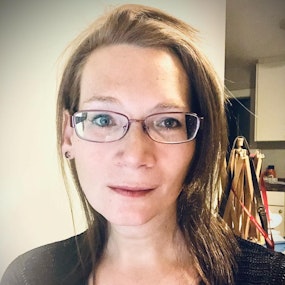
Erika Lind
Cloud Systems Administrator
Erika is a native of the pacific northwest who had a thirst for travel and adventure from a young age. After leaving home at 21 to move to NYC, she began a career in technology. Erika has since renounced her US citizenship to move to Vancouver, BC. She is also an avid female solo traveler who has been to Iceland, Sweden, Finland, and Estonia by herself.
Dismayed by the inconvenience and expense of US tax filing obligations for expats abroad, she decided to renounce her citizenship in 2021, solo traveling to Mexico during the pandemic to complete the process. She now lives happily ever after as a Canadian citizen in Burnaby, BC.


























